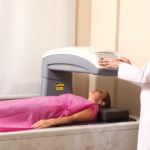For women with antiphospholipid syndrome (APS), treatment with a combination of heparin and aspirin during pregnancy—rather than aspirin alone—may increase live birth rates, according to new research.


For women with antiphospholipid syndrome (APS), treatment with a combination of heparin and aspirin during pregnancy—rather than aspirin alone—may increase live birth rates, according to new research.

Bethany Marston, MD, & Jason Kolfenbach, MD |
For most doctors, fellowship training represents the final two to three years of formal medical education, and recognition of the unique opportunities of this time period can help aspiring rheumatologists get the most out of their fellowship. Fellowship training is inherently different than residency training, with less structured time, smaller teams (often consisting of only…

Recent research found inflammatory arthritis caused by immune checkpoint inhibitors (ICIs) may become a long-term disease, requiring rheumatology care and immunomodulatory treatment. Some patients experience active inflammatory arthritis years after ICI cessation…

David Y. Chen, MD, PhD, & Eric J. Gapud, MD, PhD, on behalf of the ACR Committee for Ethics & Conflicts of Interest |
Prescribing stewardship is just one ethical consideration facing rheumatologists during the COVID-19 pandemic.

A recent study found SLE patients may improve their daily physical function, pain and overall quality of life by adding upper limb exercises to stable treatment regimens and routine care…

Nayimisha Balmuri, MD, Jacob Spitznagle, MD, & Karen Onel, MD |
A 17-year-old girl presents to the pediatric rheumatology clinic for follow-up of recently diagnosed systemic lupus erythematosus (SLE) characterized by class IV lupus nephritis, photosensitive rash and antiphospholid antibody positivity. She is currently being treated with prednisone, mycophenolate mofetil, and hydroxychloroquine. She is accompanied by her mother, who has been very involved in the patient’s…

ATLANTA—With more than 3,000 abstracts from 103 countries presented at the 2019 ACR/ARP Annual Meeting in November, it was impossible for attendees to view them all. However, two ACR/ARP veterans—Arthur Kavanaugh, MD, from the University of California, San Diego, and John Cush, MD, from UT Southwestern Medical School, Dallas—chose to tackle the nearly impossible task and…

ATLANTA—Osteoporosis in premenopausal women is uncommon compared with its frequency in post-menopausal women, but when it is suspected, it poses some difficult questions for clinicians: How should it be diagnosed in this understudied population? If found, should it be treated—and how? Elizabeth Shane, MD, professor of medicine at Columbia University and attending physician at New…

Reproductive health can be a concern for patients with rheumatic diseases, and practitioners in both rheumatology and obstetrics/gynecology often work closely together. The 2020 ACR Guideline for the Management of Reproductive Health in Rheumatic and Musculoskeletal Diseases, new clinical recommendations developed by an ACR-convened group for pregnant women, post-menopausal women, lactating women, and women and…

The evidence-based guideline includes contraceptive recommendations and suggestions for rheumatologists co-managing patients with obstetrician-gynecologists and other specialists.